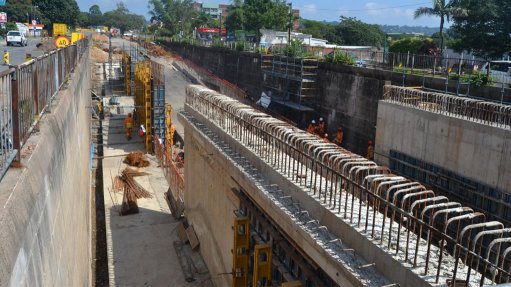
Photo by: GoDurban
The eThekwini Municipality’s GO!Durban integrated rapid public transport network will continue to progress at a rapid pace this year, transport authority head Thami Manyathi said on Wednesday.
With five major construction tenders totalling R2.2-billion having been awarded in 2014, focus would now shift to the construction of a temporary traffic management centre (TMC), to be completed this year, to support the C3 corridor operations between Bridge City, in KwaMashu, and Pinetown.
A contract for the construction of the new TMC in the Centrum site would also be awarded this year.
Of the tenders awarded in 2014, R890-million worth of work was awarded to black-owned companies. A further R367-million of the total amount was allocated to enterprise development.
GO!Durban also achieved other major milestones in 2014, including the signing of a memorandum of agreement with the leadership of the minibus taxi industry, the unveiling of the project’s empowerment charter, the launch of the city’s nonmotorised transport network – including sidewalks, offroad paths, safe crossings, pedestrian bridges and cycle areas – the consolidation of the cashless Muvo smartcard system, engagements with community stakeholders, businesses and eThekwini residents, as well as the launch of a mobile marketing and other key brand awareness events.
Construction of the dedicated lanes for buses started on various segments of the 24 km C3 corridor, including on a large portion of the provincial MR577 road.
Construction also started on an underpass that would extend under the M25, or Curnick Ndlovu Highway, connecting the Bridge City precinct to the Phoenix industrial area.
In 2015, work would be advanced on this route, and construction would start on the Bridge City depot and terminal, in KwaMashu, while station construction would also start, with the first one being built in New Germany.
In October, the GO!Durban empowerment charter was launched, which was not a preferencing policy, nor an embellishment of black economic-empowerment regulations, but a series of additional specifications added by the GO!Durban project to all contracts awarded on the project.
This unveiling created an opportunity for various stakeholders to understand the empowerment requirements of the project and how it was set up to support local communities and businesses through a share in the equity, skills development, enterprise development and corporate social investment or socioeconomic development.